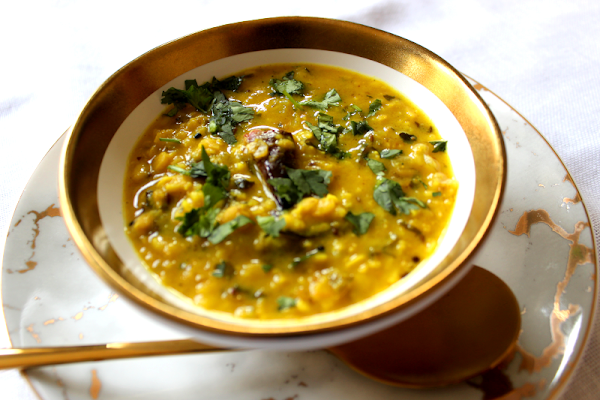Rasams are a thin, soupy and spicy dish, traditionally served as the second course of a south Indian meal. Usually featuring tamarind and lentils, this dish does not include tamarind, but lemon juice instead, along with fresh tomato, for the tangy and tart element, with smooth coconut milk and traditional tempering spices to complete the flavor profile.
This rasam is a bit thicker than many I have made, but if you want a more watery version, increase the liquid component to suit your preferences. Though the addition of fenugreek leaves are optional, I highly recommend them as they add a further unmatched slightly bitter, smoky element to the rasam. Light, easy to digest, nourshing and delicious, this may just become a staple dish on your menus too.
 Lentil and Coconut Milk Rasam Lentil and Coconut Milk Rasam |
Recipe by Lisa Turner
Cuisine: South Indian
Published on December 10, 2023
Spicy and tangy south Indian split dal and tomato soup with coconut milk
Preparation: 20 minutes
Cooking time: 1 hour 30 minutes
 Print this recipe Print this recipe
Rasam:
- 1/2 cup dried toor dal (split pigeon peas)
- 1/2 cup split skinless urad dal
- 2 tablespoons olive oil
- 2 large shallots or 1 large onion, finely chopped
- 3 fresh green or red chilies, seeded and minced
- 1-inch fresh ginger, peeled and grated or minced
- 1 medium tomato, diced
- 14 oz (400 mL) can coconut milk
- 1 1/2 cups hot water + more as needed
- 1 teaspoon ground turmeric
- 1 tablespoon dried fenugreek leaves (methi) (optional)
- 1 1/2 teaspoons sea salt, or to taste
- fresh cracked black pepper, to taste
- juice from 1 lemon (3 tablespoons)
Tempering:
- 1/2 tablespoon olive oil
- 1 teaspoon brown mustard seeds
- 1 teaspoon cumin seeds
- 1/2 teaspoon asafetida
- 2 dried whole red chilies, broken into pieces
- small handful of dried curry leaves, crumbled
Garnish:
- 1/4 cup fresh cilantro, trimmed and chopped
Instructions:
Wash the split dals thoroughly in a strainer and transfer to medium saucepan. Add 3 cups of water, bring to a boil, reduce the heat to low, and partially cover. Simmer until the dals are soft and tender, about 1 hour. Turn off the heat and set aside.
Heat the oil in a large saucepan over medium heat. When hot, add the shallot or onion, fresh chilies, and ginger, and sauté for 5 minutes, until the shallots have softened. Add the tomato and stir for another 2 to 3 minutes. Pour in the coconut milk and stir in the cooked dal, then pour in the hot water and add the turmeric and dried fenugreek leaves, if using. Bring to a boil, reduce the heat to medium-low, and simmer uncovered for another 20 minutes, stirring frequently. Add more water if the rasam seems too thick. Remove from the heat, and stir in the salt, black pepper, and lemon juice.
For the tempering, heat the oil in a small heavy-bottomed saucepan over medium heat. When hot, add the mustard seeds and cumin seeds. Cook until the mustard seeds turn grey and begin to splutter and pop, about 60 seconds. Add the asafetida, dried chilies, and curry leaves. Cook for another minute and pour the contents of the pan into the cooked rasam. Cover and let sit to allow the flavors to blend.
Serve hot, garnished with cilantro, along with fresh cooked rice.
Makes 4 to 6 servings |

More rasam recipes from Lisa's Vegetarian Kitchen:
Classic Mulligatawny Soup
Tomato Tamarind Soup (Rasam)
Tomato and Lentil Rasam with Barley
Beetroot Rasam
On the top of the reading stack:
The Sanatorium under the Sign of the Hourglass by Bruno Schulz
 Lentil and Coconut Milk Rasam
Lentil and Coconut Milk Rasam Print this recipe
Print this recipe



No comments:
Post a Comment